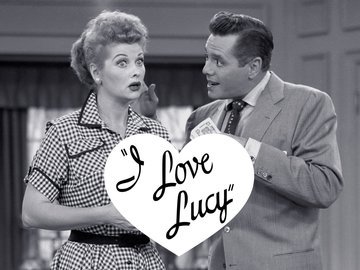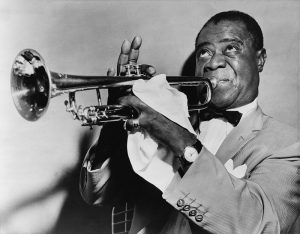Winner of the Fall 2016 StMU History Media Awards for
Best Explanatory Article
Most Captivating/Engaging Article
Best Use of Multiple Images
Best Introductory Paragraph
Best Overall Research
“Lucy, you got some splainin’ to do!” These words were heard by families across America repeatedly in the 1950s. Uttered in a thick Latin accent by none other than Ricky Ricardo, the bongo playing, bandleader, Cuban husband of the flighty, redheaded, Lucy Ricardo on the 1950s television situation comedy, I Love Lucy. This popular television comedy entered the homes of people across America in the years 1951 to 1957. In the six-year span that the show was on the air, it never ranked lower than third nationally among television programs.1 So the question arises: what was it about this show that was so popular among the families in America? The answer to that is simple. I Love Lucy told the tale of a common housewife who dreamed of more than cooking and cleaning; she wanted to be a star. Housewives throughout America related to the character of Lucy Ricardo who longed for more in life, in the period of American history that has been called The Affluent Society.

Lucille Ball was born in Celoron, New York in 1911 to a family who believed that hard work was needed to achieve success. She found work in movies and on the radio, and had a recurring role on the hit CBS radio show, My Favorite Husband.2 Desi Arnaz was born in Santiago de Cuba, Cuba in 1917 to a wealthy family. His father was a politician and landowner and his mother was an heiress. The Revolution of 1932 in Cuba hit the Arnaz family hard, and they were ultimately forced to move to Miami, Florida.3 Arnaz met Ball in 1940. The two immediately connected with one another, and after a five-month whirlwind romance, the couple was married.
However, the marriage was rocky from the start, and it did not help that Ball was forced to stay home due to her acting and radio career, while Arnaz toured with his band. When the director of My Favorite Husband offered Ball the opportunity to take the show to the new medium of television, she jumped at the chance on the one condition that Arnaz be cast for the role of her on-screen husband. Ball was looking for a way to save her marriage, and she believed that working with Arnaz and having him close to home was the way to do it. CBS was hesitant to agree to her request, but they wanted Ball so they decided to film a pilot for the show.4 With her hardworking, no-nonsense family background, Ball was determined to make the show a success. Arnaz and Ball became Lucy and Ricky Ricardo on the immediate hit television show that would run for the next six years.
Family life in the 1950s focused mostly on men working while women stayed home, kept the house, and raised children. Pediatrician Dr. Benjamin Spock published Baby and Child Care, a book that highlighted an approach to raising children that was child-centered as opposed to parent-centered. Dr. Spock viewed the role of the mother as belonging at the center of the household while the husband was the breadwinner and had very little to no interaction in raising children.5 This view began to generate dissatisfaction among women who longed for a more fulfilling life.

I Love Lucy focused on the life of Lucy Ricardo, a ditzy housewife with dreams of fame and fortune, and her Cuban, bandleader husband Ricky. Lucy was far from the typical housewife; she was not satisfied with simply staying home and keeping house while her husband worked or went out with friends. She had quite the imagination and came up with schemes to break into show business, which usually caused tension between her and Ricky. Lucy brought the desires for something more that were locked away in the hearts of housewives across America, and she brought those desires out into the public eye. While she did play her role in an extremely comedic way, she somehow always returned to the dutiful housewife of the 1950s.6

Producers were not sure what the audience would make of Arnaz. He was a television first in many ways; he was the first Hispanic actor welcomed into the homes of the American people on a regular basis. It was the first time many had ever heard a Latino accent, and Arnaz did not fit the typical Hispanic stereotype that most Americans held at that time. Arnaz was handsome, smart, dignified, warm, responsible, employed, loyal, and married. The producers were also concerned about the audience viewing the Ricardo’s marriage as interracial, and this was not something that had ever before been aired openly in movies or on television. Despite these obstacles, Arnaz was treated as an equal white American, and accepted graciously throughout the nation.7

During its six-year reign, I Love Lucy ranked in the top three spots nationally among television programs. Exceptional talent in acting, comedic timing, writing, directing, editing and above all, being relatable, made I Love Lucy an instantaneous success.8 Lucille Ball accepted her role as the zany housewife, Lucy Ricardo, and ran with it. She was not afraid to put herself out there, work hard, and make her dreams come true. Housewives across America finally had a female television star that they were able to relate to; someone who knew there was more to life than cooking and cleaning. With this in mind, maybe, just maybe, they too could stand up and do something more.
- Salem Press Encyclopedia, January 2016, s.v. “I Love Lucy (TV),” by Mary Hurd. ↵
- Salem Press Encyclopedia, January 2016, s.v. “Lucille Ball,” by Richard Adler. ↵
- American National Biography (From Oxford University Press), 2010, s.v. “Desi Arnaz,” by Tinky “Dakota” Weisblat. ↵
- Gigi Anders, “’Luuu-cy!’,” Hispanic 14, no. 11 (November 2001): 44-46. ↵
- Alan Brinkley, American History: Connecting the Past Volume 2, 15 edition (New York: McGraw-Hill Education, 2014), 764. ↵
- Salem Press Encyclopedia, January 2016, s.v. “I Love Lucy (TV),” by Mary Hurd. ↵
- Gigi Anders. “’Luuu-cy!’,” Hispanic 14, no. 11 (November 2001): 43. ↵
- Salem Press Encyclopedia, January 2016, s.v. “I Love Lucy (TV),” by Mary Hurd. ↵



106 comments
Mariana Govea
This article was great! I love reading articles about powerful women who decide to take a step on women’s equality! I had always heard of Lucy but I never really knew who she was or why she was so big In the United States! But now thanks to this article now I know why! How could the American women not love her if she was beautiful, funny, and even the lady that everyone aspired to be since during that time, the women was mostly seen as a stay at home mom! As well as for Arnaz, it makes me so happy to know that he went on national tv knowing he could have failed and that the critics couldn’t have liked him but he still did! What a great love story! They were both a perfect couple that wanted to succeed and they did not mind doing it together or afraid of doing it together!
Elizabeth Garibay
This article was great! From the first sentence my attention was fully into this article. I was engaged to read more. Growing up I would always see my mom and aunts watching this show. It amazes me that many woman would watch this show and would be inspired by her . Its also amazing how she is the first Hispanic actor was introduced to the American public and was not criticized. Overall I wanted to keep on reading when the article was over although they covered most of my questions. I would recommend this article to anyone!
Gabriela Medrano
You here about the show but because of modern programming and the variety of shows it provides we do not praise “I Love Lucy” quite as much as we should! Although there were a lot of risks and obstacles in airing this television show it’s success was found in the shared dreams of many American women of the 1950’s and Lucy. Great topic and way to resurface this good show and show your admiration for its positive influence on American culture.
Bailey Rider
This article was very good. I love how you picked a topic that America was infatuated with on T.V. and how you incorporated the struggles of the time into the situation. It was interesting to learn about Lucy Ball and how, especially in the 50s, she wasn’t following proper behaviors for housewives. It was also cool to learn how even though her husband was Hispanic, the American public accepted him and their interracial marriage on T.V., which was a first. Great job!
Samuel Sanchez
I really liked the opening sentence. Really captured my eye and pulled me in. When I was younger, I would occasionally watch the show “I Love Lucy” but I never knew the background of the show. I did not know how ground breaking the shows. How it introduced an ideal that housewives wanted. Breaking the norm what was usually on tv.
Gabriela Serrato
As I grew up, and even now I find my mom still watching this show. It is true that it did bring so much joy and related very well to women across the country. It is also nice that the first Hispanic actor was introduced to the American public and was not criticized or hated! This show really united people as well as brought laughter to almost every household.
Lianna Ybarra
First off, the opening sentence grabbed my attention from the beginning! Great job!! I have never seen the show “I Love Lucy” before but I remember always seeing clips of it from different commercials and hearing my grandparents/parents talking about it. I thought this article was very interesting and informative even for those of us who haven’t seen the show before. I liked the background information you gave especially how they were married in real life! That is so awesome that they were able to be on a show together while Lucy was still paving the way for many women!
Jennifer Pogue
Growing up I would regularly watch I Love Lucy with my mom and grandma. I loved the show but never knew the history behind it. I did not realize that Lucy was a role model for all women and set an example they could be more than the stereotypical house wife. This article reminds me of how important it is to have positive role models in the media that everyone can relate to. It is important to support positive role models so they can continue to set great examples for our generation and the generations to come.
Luke Trevino
Growing up I had only heard of the show but never truly what it was about. This article really explained what the show was about and what it stood for. I knew the show was famous but I did not know for what reason. It’s truly amazing that this one show cause hundreds of women to finally start breaking away from the stereotype of a housewife! Overall, a very good essay and would easily suggest it to a friend!
Nataly Solis Chavez
Although I am somewhat familiar with the show “I Love Lucy” I hadn’t realized there was so much back story to it! For starters I had no idea that Lucille Ball and Desi Arnaz were actually married. Not to mention the fact that Desi Arnaz was originally from Cuba and his appearance on American television as a Latino male had little to no negative reviews. Thanks for a beautiful delivery of such interesting information!